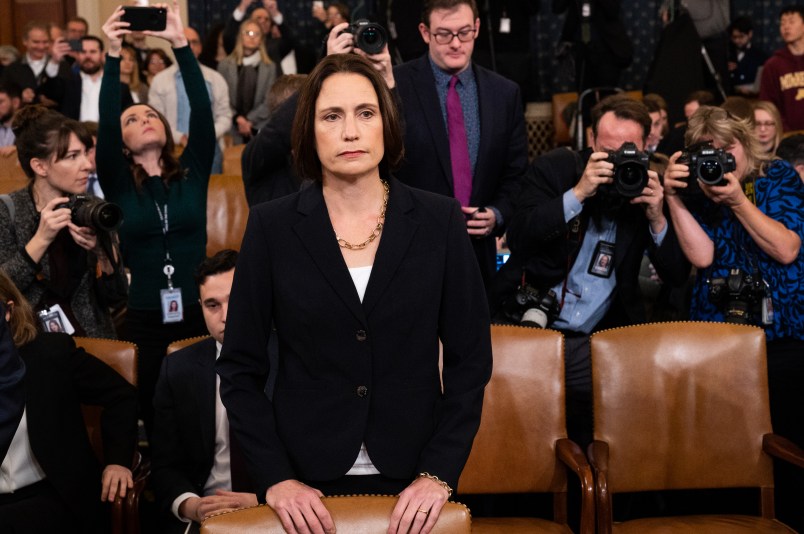The former Russia and Europe director on the White House National Security Council drew Republican fury during her impeachment inquiry testimony Thursday for accusing GOP inquisitors of downplaying Russian election meddling.
In her opening statement and during the course of several hours of testimony, Dr. Fiona Hill said Republicans were playing into Russia’s hands by pushing some of the same Ukraine election meddling conspiracies that Donald Trump pressured Ukraine’s president to investigate.
“Based on questions and statements I have heard, some of you on this committee appear to believe that Russia and its security services did not conduct a campaign against our country—and that perhaps, somehow, for some reason, Ukraine did,” she said at the start of the hearing. “This is a fictional narrative that has been perpetrated and propagated by the Russian security services themselves.”
Rep. Elise Stefanik (R-NY), an outspoken Trump defender during these hearings, took issue with that.
“Not a single Republican member of this committee has said that Russia did not meddle in the 2016 elections,” she said, pointing to a report published last year by House Intelligence Committee Republicans — though it did not conclude, as intelligence agencies did, that Russia meddled to help Trump.
But Stefanik’s denunciation rang a little hollow. Here’s why.
Republicans haven’t challenged Trump’s crazy theory about Crowdstrike, which absolves Russia of meddling in 2016.
On Friday morning in a Fox News interview, Trump revived a conspiracy theory that he’s pushed again and again, asserting that a Democratic servers hacked by Russians actually ended up in Ukrainian hands.
His allies in Congress have stayed silent in the face of this blatantly pro-Russia conspiracy, which asserts among other things that Russia was framed by American investigators and Democrats. In fact, several Republican lawmakers have pushed for answers on it themselves.
In 2016, after realizing they’d been hacked, the Democratic Party hired the cybersecurity firm Crowdstrike to investigate what’d happened. The firm concluded that Russia was responsible and gave evidence of that conclusion to investigators.
The Crowdstrike conspiracy Trump has pushed — and which he pressured the Ukrainian president to investigate — asserts that the evidence Crowdstrike gave to investigators was manufactured, and that the real “server,” which was not physically handed over to the FBI, contains evidence that would absolve Russia of fault.
For some reason, Trump seems to believe Crowdstrike is a “Ukrainian company” that’s “owned by a very wealthy Ukrainian,” as he said Friday. In reality, it’s based in California and was co-founded by two men, both American citizens. One of them, Dmitri Alperovitch, was born in Russia.
White House chief of staff Mick Mulvaney has said publicly that this server conspiracy was also one of three reasons the White House held up a nine-figure aid package to Ukraine.
Republicans have pushed several theories equating Ukrainian and Russian activity in 2016.
Aside from the Crowdstrike theory, Republicans in the impeachment inquiry have pushed several assertions about purported Ukrainian meddling in the 2016 elections that they’ve sought to equate to Russian meddling.
The theories grew from a January 2017 Politico article about a Ukrainian-American DNC contractor who reached out to the Ukrainian embassy in Washington, D.C. for information on Paul Manafort. The article also discussed the release of the so-called “black ledger” by a Ukrainian journalist and then-parliamentarian. The record of off-books payments led to the resignation of the Trump campaign’s then-chairman Paul Manafort.
Rudy Giuliani repeatedly publicized these theories on cable TV as he led Trump’s pressure campaign on Ukraine from outside government, and House Intelligence Committee Chairman Devin Nunes (R-CA) has parroted them in multiple impeachment inquiry hearings.
Asked repeatedly about these theories in her closed-door deposition, Hill expressed her frustration at what she said was Republicans playing into Russia’s hands.
“It does not amount to a large-scale Ukrainian Government effort to subvert our elections which is comparable to anything that the Russians did in 2016,” she said.
“And if we start down this path, not discounting what one individual or a couple of individuals might have done, ahead of our 2020 elections, we are setting ourselves up for the same kind of failures and intelligence failures that we had before.”










